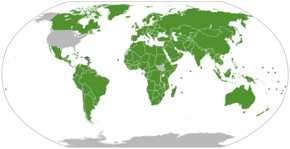Basel Convention facts for kids
| Basel Convention on the Control of Transboundary Movements of Hazardous Wastes and Their Disposal | |
|---|---|

The logo of the Basel Convention Secretariat
|
|
| Type | United Nations treaty |
| Signed | 22 March 1989 |
| Location | Basel, Switzerland |
| Effective | 5 May 1992 |
| Condition | Ninety days after the ratification by at least 20 signatory states |
| Signatories | 53 |
| Parties | 191 |
| Depositary | Secretary-General of the United Nations |
| Languages | Arabic, Chinese, English, French, Russian, Spanish |
The Basel Convention is an international agreement, like a set of rules for countries, about moving dangerous trash, called hazardous waste. Its main goal is to stop richer, developed countries from sending their hazardous waste to poorer, less developed countries.
The agreement also encourages all countries to create less waste and manage it safely, as close as possible to where it was made. It helps developing countries learn how to manage the hazardous waste they create in a way that is safe for people and the environment. This agreement does not cover radioactive waste, which is handled by a different international group.
The convention was opened for countries to sign on March 22, 1989, and it officially started on May 5, 1992. As of 2025, 191 parties (which includes 188 countries, the Cook Islands, the European Union, and the State of Palestine) have joined. The United States has signed the agreement but has not officially ratified it, which means it hasn't fully agreed to follow all its rules.
In 2019, a very important change was made to include plastic waste as a material that needs to be controlled. This happened after more than a million people around the world signed a petition asking for action to protect the oceans from plastic pollution.
Contents
Why Was the Convention Needed?
In the 1970s, many developed countries created new, stricter environmental laws. These laws made it very expensive to get rid of hazardous waste. At the same time, it became easier to ship things around the world.
Some companies saw this as a chance to save money by sending their dangerous waste to less developed countries, where the rules were not as strict. This led to some terrible events that showed why a global agreement was needed.
The Khian Sea Incident
One famous case was the Khian Sea incident. A ship carrying ash from an incinerator in Philadelphia, USA, tried to dump its cargo. It dumped some of the ash on a beach in Haiti before being forced to leave. The ship then sailed for many months, even changing its name to avoid being caught. It is believed that the crew eventually dumped the rest of the toxic ash into the sea.
The Koko, Nigeria Incident
In 1988, five ships from Italy brought 8,000 barrels of hazardous waste to the small town of Koko in Nigeria. A Nigerian man was paid a small amount of rent to let them store the toxic barrels on his farmland. This dangerous waste poisoned the land and made many people sick. Events like these showed that the world needed rules to stop this kind of dumping.
What Is 'Hazardous Waste'?
Under the Basel Convention, a waste is considered "hazardous" if it meets two conditions:
- It is on a list of specific types of waste, like used oils, medical waste, or old batteries.
- It has a dangerous characteristic, such as being:
- Explosive
- Flammable (catches fire easily)
- Toxic (poisonous to humans or other living things)
- Corrosive (can eat through metal or skin)
A waste is also covered by the convention if the country sending it, the country receiving it, or any country it passes through has laws that call it hazardous.
The rules do not apply to radioactive waste or the normal waste that comes from ships operating at sea, as these are covered by other international agreements.
What Are the Rules?
The convention has strict rules for moving hazardous waste between countries. The main idea is that countries should take care of their own waste.
- Notice and Consent: Before a country can send hazardous waste to another, it must officially inform the receiving country and any countries it will pass through. The receiving country must give its written permission. This is called "prior informed consent."
- Tracking: All shipments of hazardous waste must be tracked with paperwork from the place it was created to its final, safe disposal location.
- Trade with Non-Parties: In general, countries that have joined the convention are not allowed to trade hazardous waste with countries that have not joined.
- Illegal Traffic: The convention states that moving hazardous waste without following the rules is a crime. It is up to each country to enforce this and punish those who break the law.
The Basel Ban Amendment
After the convention started, many developing countries and environmental groups felt the rules were not strong enough. They argued that simply getting permission was not enough to protect them. They wanted a complete ban on shipping hazardous waste from richer countries to poorer ones.
This led to the Basel Ban Amendment, which was adopted in 1995. This amendment prohibits the export of hazardous waste from a list of developed countries to developing countries for any reason, including for recycling.
It took a long time for enough countries to approve the amendment, but it finally went into effect on December 5, 2019. This made the rules much stronger for the countries that ratified it.
What About Plastic Waste?
In recent years, the world has become very concerned about plastic pollution. It is estimated that there are 100 million metric tons of plastic in the world's oceans, which harms wildlife like seabirds, turtles, and whales.
In May 2019, most countries in the world agreed to add most types of plastic waste to the list of materials controlled by the Basel Convention. This was a huge step to help solve the plastic crisis.
Now, shipping plastic waste between countries requires the same "prior informed consent" process as other hazardous wastes. This makes the global plastic trade more transparent and ensures that plastic waste is sent only to places that can manage it safely. This change also encourages countries to create less plastic waste and to recycle more of it at home.
Keeping Watch: The Basel Action Network
The Basel Action Network (BAN) is a non-governmental organization that acts like a watchdog for the convention. It is a charity that works to protect people and the planet from toxic waste.
BAN's main goal is to fight the export of toxic waste, including old electronics and plastic, from industrialized societies to developing countries. Based in Seattle, USA, BAN investigates and exposes illegal waste shipments to make sure the rules of the Basel Convention are followed.
See also
 In Spanish: Convenio de Basilea para niños
In Spanish: Convenio de Basilea para niños
- Asbestos and the law
- Bamako Convention
- Electronic waste by country
- Rotterdam Convention
- Stockholm Convention
 | DeHart Hubbard |
 | Wilma Rudolph |
 | Jesse Owens |
 | Jackie Joyner-Kersee |
 | Major Taylor |


